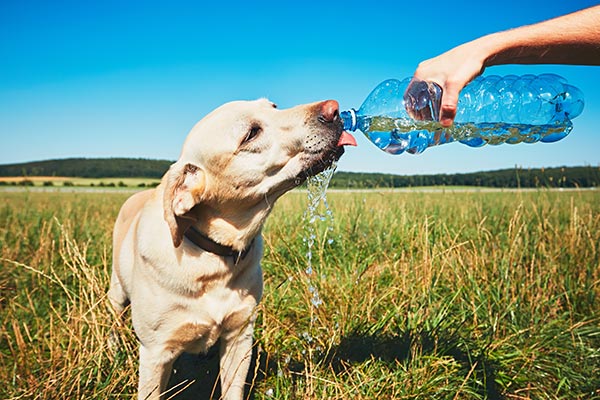Hot Weather Tips For Your Dog

It’s taken a while, but the summer heat is finally beginning to settle in to Indiana. Spending time outside, savoring these short summer months with your dog is great, but too much of a good thing can be harmful or even deadly to your four legged friend. Here are some tips for enjoying the summer days with your dog safely.
Tip No. 1: Hydrate.
Living in a region where it is so cold for so many months, it’s easy for you to slip into a habit of not drinking enough water – the same goes for pets. Be sure to provide them with plenty of fresh, cool water when the days begin to heat up. If you are going to be outside for a while, or it’s been extra toasty out, you can offer your dog an ice block treat as both a fun activity and cooling treat.
When you go out on walks on hot days, offer your dog water regularly, but not too much at once. Gulping down too much water at once can cause an upset stomach, bloat and other dangerous or uncomfortable conditions.
Tip No. 2: Remember the 5-Second Rule.
No, not the one where if you drop food, it’s still good if you pick it up before 5 seconds. (If you have dogs around, good luck with that food still being there after 5 seconds, anyway!) The 5-second rule we are referring to is a rule of thumb for when considering a walk with your dog on a hot day.
Before heading out, place the back of your hand on the asphalt. If it is too hot to leave your hand there through 5-mississippis, it is too hot for your dog to walk on safely.
Tip No. 3: Know the Symptoms of Overheating.
Pets overheat far easier than humans, especially those with flatter faces or short snouts, like Pugs, Bulldogs, Boston Terriers, and Persian cats. Know the symptoms of overheating and heat stroke so you can take action if necessary.
These symptoms include excessive panting or difficulty breathing (fast, noisy respiration), increased heart rate, drooling, bright red or even blue gums, weakness, and eventually collapsing, convulsions, vomiting, and diarrhea. Test your heat stroke knowledge with this quiz.
Tip No. 4: Never, Ever Leave Pets in a Parked Vehicle.
While it may seem like a mild day, even a 75 degree temperature outside can quickly become 94 degrees and after 30 minutes, 109 degrees inside a parked car. Even with all 4 windows cracked, temperatures climb quickly to dangerous levels in parked cars.
Never leave your pet in a parked vehicle for any length of time, even with the windows cracked.
Tip No. 5: Get a Summer Groom, But Not TOO Short.
A shorter haircut for summer can make your pup look cute and help your pet keep their cool, but never completely shave your dog. A layer of fur helps regulate their body temperature and prevent sunburn. If your dog has an extra-short coat and spends lots of time outdoors, ask the veterinarian about a pet-safe sunscreen.
Don’t assume your favorite brand of sunscreen will also be safe for your dog! Many sunscreens that are safe for us can be toxic to dogs and cats. Brushing longer coated dogs and cats more frequently, or using a de-shedding tool like the Furminator can help remove excess fur and help increase airflow, keeping your pet cool without sacrificing their longer look.
Tip #6: Don’t Assume They Can Swim.
While dogs may have a basic swimming stroke named after them, not all dogs are great swimmers. If you have a pool or lake near your home, take safety precautions as you would for children to protect your pet.
If you are headed out to a lake for some time on a boat or kayak, be sure your dog is wearing a life preserver. If you do take your dog swimming, realize that even super swimmer dogs will get tired, which can get dangerous.
Tip #7: Remember The Parasite Preventatives.
Hot summer days are prime time for fleas and ticks. It is especially important that you remember to give your pets a monthly flea, tick, and heartworm preventative in these warmer months. Ask the veterinarian which brands of parasite preventatives are right for your dog or cat.
Tip #8: Have Fun.
Most importantly, have fun. Spend time making memories with your family and pets. If you have any questions about caring for your pet during the hotter months, need flea, tick, and heartworm preventatives, or have any other veterinary needs, contact us at Academy Animal Hospital!
